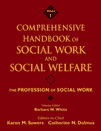Policy Practice
Abstract
This chapter provides an overview of the processes involved in social welfare policy practice. It includes two case studies—the first involves a direct practitioner desiring to change agency policy and the second depicts an agency's executive director targeting legislative change at a state and local level. Each of these vignettes is used to illustrate the activities practitioners often undertake during an episode of policy practice. An episode of policy practice can be conceived as a series of sequential but overlapping stages, including preparing oneself; assembling a team; identifying, defining, and legitimizing the problem; selecting an approach for analysis; conducting the analysis; and evaluating the outcomes of the policy initiative. For each stage, the chapter identifies and describes general principles that can be applied across all levels of policy and adapted to any policy practice setting. Both vignettes are set in the United States, but the discussion of each stage also includes comments relevant to international policy practice and practice with immigrants and refugees residing in the United States. The chapter identifies specific, practical models of policy analysis and makes recommendations as to their appropriateness for different policy practice settings. In addition, it discusses processes to be used to research the Internet for information about the structure of the government and the content of social welfare policy in the United States and abroad.



